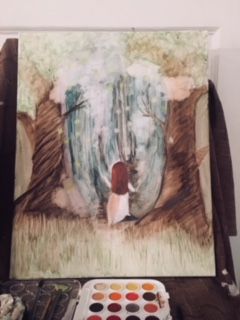At our house, a lot changes between Saturday morning and Saturday night. We have six children, and often someone has some kind of sports ball thing happening during the day.
And of course, there is the almost-weekly cleaning of the house, all hands on deck.
On especially beautiful Saturdays, there might even be time to go to the park and then naps for everyone. A nap for you! And a nap for you! And a nap for you!
But on one particularly slow Saturday, when there was not much cleaning to be done, and there were no athletic competitions to attend, and everything outside was gray and cold and damp, the eight of us remained inside.
My 13-year-old daughter Lucy began work on a painting she had been talking about for months. I peeked into her room from time to time, checking on her progress.
She had envisioned a little girl walking into a dark and foreboding wood. The painting would be of the girl from behind, in a white night gown. In front of her would be the shadows from the trees and fog drifting over a narrow path, and deep in the recesses of the painting she imagined tiny flashes of light: faeries waiting.

It was fun watching her progress, catching snapshots of the emergence of this image. I stopped by her room every hour or so.
I had to go away for a few hours later in the afternoon, and when I came home, I couldn’t wait to see the painting. But as soon as I walked in the door, my 8-year-old son gave me the news.
“Lucy painted over her painting.”
She painted over her painting?
“She did what?”
“She didn’t like her painting, so she painted over it.”
My son seemed oddly unaffected. I, however, was heartbroken.
Though I have been busy, perhaps overbusy, all my life, it seems to me now that I have accomplished little that matters, that the books have never come up to what was in my head, and that the rewards—the comfortable income, the public notice, the literary prizes, and the honorary degrees—have been tinsel, not what a grown man should be content with.
Wallace Stegner, Crossing to Safety
I have continued thinking about this thing my daughter did, this painting over of what I thought was becoming a lovely creation.
I know why she did it—I have had, and sometimes given in, to that impulse as well.
A short story goes nowhere? Delete it.
A poem stares back up at me, impotent and lazy: ball up the paper and throw it in the bin.
I stumble on the first 15,000 words of a novel that never quite survived its birth? Put the entire folder in the trash.
I know what it’s like to feel disappointment in what I have created.
And yet.
I wonder.

Are our creations, our stories, our paintings, our photographs, our sculptures, our pottery, our sewing, our songs…are they always meant to be these shining beacons, things we put up on pedestals and worship, as at the end of a pilgrimage?
Or are these creations of ours actually more like mile markers, posts that show us both how far we have come and how far we have yet to travel?
I am leaning towards the latter.
If we do not paint our paintings, and show them to those around us, until they are perfect, we will live long, fruitless lives. If we do not write our books until the ideas are fully formed, and our conclusions sure, and our skill at its peak, will there be any books?
Our creations remind us where we come from, and they can also lead us home.
Later that Saturday night, my daughter wandered into our room.
Nearly everyone else was asleep, and it was unusual for her to come and search us out. She leaned against the bed, and I asked her about her painting, and when she told me she had painted over it, I smiled. I encouraged her.
We talked about the journey of art, and I showed her the video where Ira Glass talks about The Gap:
She pulled out her phone and showed me a photo she had taken of the painting, and I was glad, because there it was, preserved after all, a mile marker for us both.

Shawn Smucker is the author of the award-winning YA novel, The Day the Angels Fell and the sequel, The Edge of Over There.



